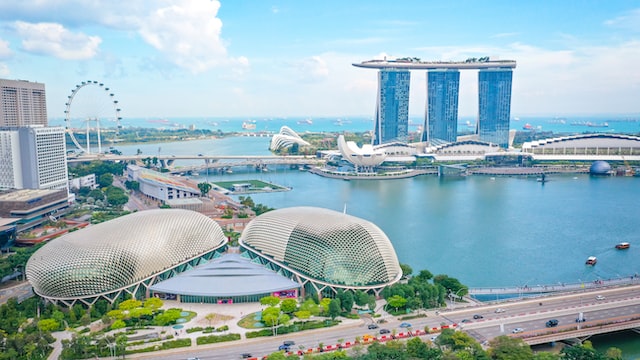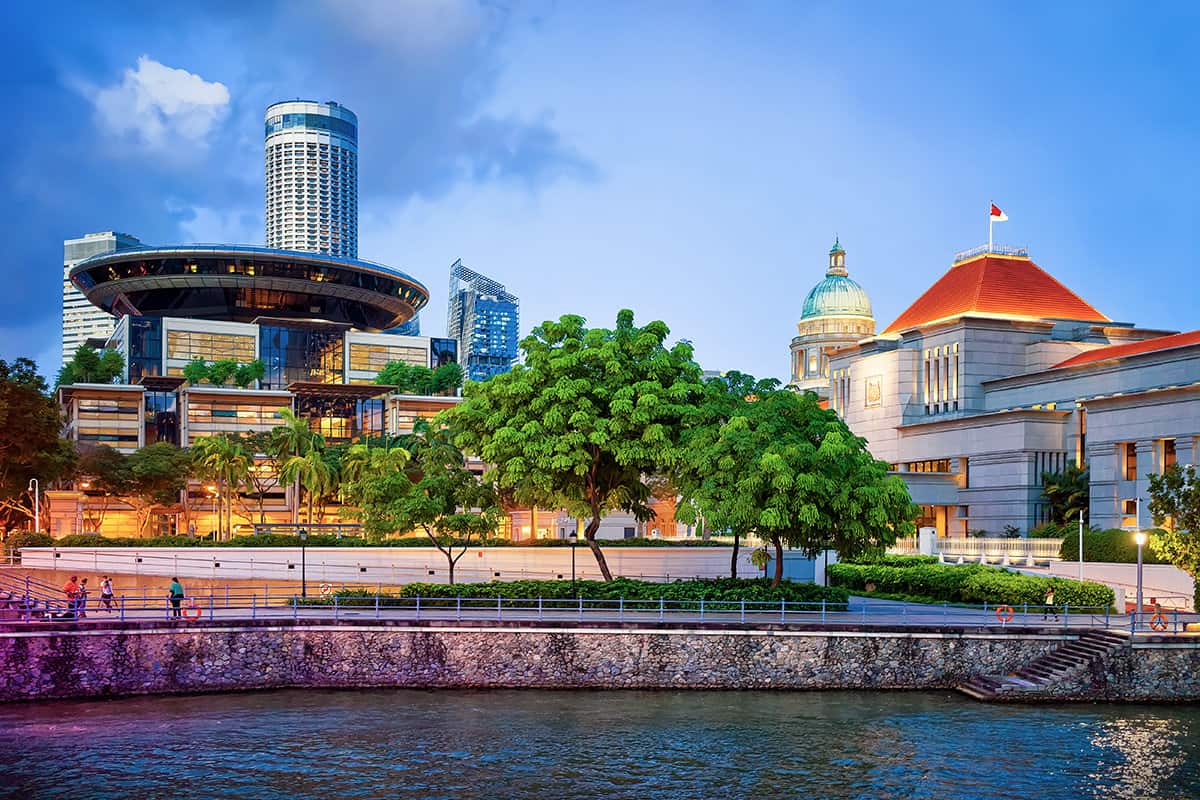Singapore vs. Dubai: Where to Incorporate?

Factors To Be Evaluated
Business Environment
Both Singapore and Dubai have prosperous economies. Due to their disparate geographical locations, they have different geographic and economic focus for their economies. Singapore focuses more on Asian nations, such as India, Malaysia, and China. Meanwhile, Dubai has developed a strong business relationship with Middle Eastern and African countries.
Singapore has a more diversified economy as compared to Dubai, the major sectors of which are shipping, banking and finance, IT, and international trade. Dubai is mainly an oil-production focused economy. However, during recent years it has succeeded in reducing its dependence on oil and encouraging the growth of tech, trade, and tourism industries.
There are also differences in the overall business culture between Singapore and Dubai. Singapore has a more formal and structured business culture, with a strong emphasis on punctuality, professionalism, and respect for hierarchy. In Dubai, the business culture is more relaxed, with a greater focus on personal relationships and networking.
Considering Singapore?
Experienced team. Affordable cost. Online platform.
Legal Regulations
Reflecting Singapore’s history of British colonization, modern Singapore legislation is based on the UK “common law” legal system. Furthermore, Singapore regularly and advances its laws, especially in the field of corporate regulations and other business laws, to meet the changing needs of its economy and society. For example, in Singapore the process of incorporating a company can be completed within a day for locals, and up to 3 days for foreigners. Singapore’s intellectual property protection system is considered one of the best in the world and has become a chief attraction for many tech and innovation startups. The country is also known for its rigorous enforcement of contracts; according to the World Bank survey, the Singapore enforceability percentage is almost 85%.
Dubai’s legal system is based on a combination of international and Sharia laws. This impacts various aspects of its business laws. The provisions of Sharia are in some cases discriminatory with respect to women. For example, for some Muslim women, it is necessary to have the consent of a male guardian, usually their father or husband, to be employed or open a business. Thus, the company incorporation process may take longer for women entrepreneurs. Only 10 percent of businesses in the private sector of Dubai are owned by women.
Additionally, foreign workers may be confused by the combination of Sharia and international law provisions, and this can result in complex and confusing disputes. The contract enforceability percentage in Dubai is 75%. This means that it is harder to enforce a contract in Dubai than in Singapore.
There are some differences in the requirements for company incorporation in Singapore and Dubai.
Singapore requires either the existence of a resident director, for locally owned companies, or a nominee director for those foreign-owned companies whose foreign owners will be running their business from overseas. In Dubai, there is no requirement for a nominee director to launch a business.
However, Dubai requires that a manager be appointed for each company who will oversee operations. The manager must be on board before the registration is approved.
Singapore requires paid-in capital of at least S$1. Dubai has no minimum capital requirement at all. But in practice, you would need paid-up capital of at least AED 300,000 (about S$110,000) to maintain credibility among investors and the government.
Another major difference relates to business ownership. Singapore allows 100 percent foreign shareholding in all sectors. Mainland Dubai allows a maximum of 49 percent foreign ownership of businesses, and the remaining 51 percent must be owned by a local resident or citizen, in some sectors such as oil or banking-related activities. However, Dubai has now established free zones that allow 100 percent foreign ownership for all company activities; but some restrictions are nevertheless imposed on such companies, such as a prohibition against trading with companies registered in mainland Dubai, etc.
Singapore and Dubai both have a very fast incorporation process that can be completed entirely online. However, the incorporation process in Dubai is more complicated: you will have to get an appropriate type of license (either commercial, or industrial, or professional) at the very beginning of the incorporation process. This may be confusing. The list of required documents for incorporation is significantly longer in Dubai than in Singapore.
The cost of incorporation differs significantly. The registration procedure in Dubai costs 17.2% of the average income per capita in the UAE, while it costs only 0.4% of the income per capita in Singapore (presuming that all your documentation is in place and that filling in a form is the only major step remaining).
You should also bear in mind that when you register your company in Dubai, you may need a translator, as certain documentation and forms must be filed in Arabic, the official language of Dubai. In Singapore, the official language is English, so all forms and documents must be submitted in English.
Corporate Compliance in Dubai vs Singapore
Both Dubai and Singapore have a strong focus on corporate compliance, and have established a range of laws and regulations to ensure that businesses operate in a fair, transparent, and ethical manner.
Singapore has developed an efficient business-government interaction model. Company incorporation as well as the subsequent compliance activities can be performed online with the assistance of a professional corporate services provider.
In contrast, most business and government processes in Dubai still require personal visits for most procedures. This results in delays and may inflate your cost of doing business. It also significantly increases the risk of corruption, which is why Dubai is ranked 20 positions lower than Singapore on the Corruption Perception Index 2021.
Taxation
Tax Residency
Singapore corporate tax residency is not defined by the place of registration but rather depends on where the company is controlled and managed. Individuals are considered Singapore tax residents if they are Singapore citizens, Singapore permanent residents, or foreigners who were present in Singapore for 183 days or more during the tax year.
Until November 2022, Dubai did not have a domestic legal definition of tax residency. That gap has now been filled. Individuals will be considered tax residents if their usual or principal place of residence is in Dubai and the center of their financial and personal interests is in Dubai, or if they have been physically present in Dubai for a period of 183 days or more in a consecutive 12-month period. A Dubai corporate entity will be considered a Dubai tax-resident if it has been established, formed or recognized in Dubai, excluding a Dubai branch registered by a foreign entity.
Tax Rates
Type of taxes
Singapore
Dubai
From January 1, 2023, Dubai will levy a federal corporate tax of 9% on companies that have paid-up profits of AED 375,000 per year (about $100,000). Companies with lesser profit will not pay any corporate taxes. This step will bring the Dubai tax system closer to international standards, as Dubai now imposes various other levies to compensate for the absence of a corporate tax. For example, Dubai has road tolls, airport tax, hotel tax, and house rent tax, as well as various license fees and fees on license renewals (some must be renewed annually).
In Singapore, the corporate tax rate is 17%. However, it can be reduced to 5-6% in certain years through the tax exemption schemes for start-ups.
Thus both Singapore and Dubai offer benefits in terms of corporate taxation.
In Singapore, GST is levied only on companies that exceed S$1 million in annual taxable turnover. The current GST rate is 7%. As of January 1, 2023, the GST rate will be increased to 8% and from January 1, 2024, GST will be further increased to 9%.
Dubai’s VAT rate is 5%. It applies to almost all goods and services. VAT registration is mandatory if the business turnover exceeds AED 375,000 (about $110,000).
DTA network
Government Incentives
Singapore and Dubai have both implemented various programs to support business development. Mainland Dubai's main areas of focus are the digital (high tech) and tourism industries. There are also some economic incentives in the free trade zones in Dubai.
In comparison, finance, high tech, and commerce are the most incentivized industries in Singapore.
For example, one of the latest incentives programs in Dubai has been launched within the NextGen FDI initiative. These incentives for digital companies include a faster business set-up process, better access to finance, easier visa procedures and attractive commercial and residential leasing terms.
The Singapore government currently offers 75 business incentives programs, significantly more than Dubai. These programs offer cash grants, reduced tax rates, free marketing assistance, and many other such benefits. You can learn about the incentives for which your Singapore company may qualify by using our Incentives matchME wizard.

Availability of a Skilled Workforce in Singapore vs Dubai
Both Dubai and Singapore have a strong focus on attracting and retaining a skilled workforce. Both cities have a diverse and international population, and are home to many highly educated and experienced professionals from around the world.
Both pay significant attention to providing high-quality education. This results in high employment rates and highly skilled workforce. The UAE was ranked first in the Arab region in the IMD World Talent Ranking (WTR 2022), and 21st globally, advancing two places compared to the previous year, while Singapore was ranked 12th.
Singapore’s workforce is more adaptive and has more experience in the financial and technology sectors. Workers are fluent in English, as it is the main language used for business in Singapore.

FTZs Differences in Singapore vs Dubai
Singapore and Dubai are both home to a number of free trade zones, which have played a significant role in the economic development of both cities. In both cities, FTZs offer a range of benefits to businesses, including tax breaks, streamlined customs procedures, and access to infrastructure and support services.
Dubai provides more than 30 free trade zones for entrepreneurs and investors. All Dubai FTZs allow tax exemptions and 100% ownership for foreign investors. Two distinct types of companies can be established in a Dubai FTZ:
- Free Zone Company: This type has multiple shareholders, up to 5. Both natural and legal persons can incorporate such a company.
- Free Zone Establishment: This type has a single shareholder with limited liability. Both natural and legal persons can incorporate such a company.
The best FTZ is located in Dubai. It is named Dubai Multi Commodities Centre (DMCC). The DMCC recently won the title of Global Free Zone of the Year for the eighth year in a row. This FTZ focuses on diamonds, crypto and coffee.
The DMCC also has a range of new infrastructure developments, such as the mixed-use Uptown Dubai District, and it plans to make Jumeirah Lakes Tower (JLT) the first smart and sustainable district of its kind in the region, powered by a 5G network.
Singapore has nine free trade zones. Each of Singapore’s FTZs offers different opportunities, has different requirements, and charges different fees. You are welcome to read about them in our Singapore Free Trade Zone guide.
Immigration Options for Company Owners in Singapore vs Dubai
The most popular immigration scheme in Dubai is called the Golden Visa. This is a long-term residence visa for durations that extend from 5 to 10 years. Foreign investors, entrepreneurs, and talented individuals who meet eligibility requirements can apply for this visa. Holders of this visa as well as their family members can settle, establish their businesses, and enjoy the benefits of extended residency.
Another option is a Green Visa for investors. This visa is designed for investors establishing or participating in commercial activities in Dubai. The visa is granted for a period of five years and is subject to renewal. The Green Visa also allows the visa holder to sponsor their first-degree relatives (up to three people). The qualification requirements are easier compared to those for Golden Visa.
In Singapore, after your company incorporation, you can apply for an Employment Pass under the new company. The approval of the pass is subject to eligibility requirements and prevailing government policies. When your pass is approved, your family will also be eligible to relocate on the Dependant Pass visa.
Alternatively, you may consider the Overseas Network and Expertise Pass (ONE Pass Singapore).
Singapore's
position
Ease of Doing Business | #2 |
Index of Economic Freedom | #1 |
| Political Environment (Global Innovation Index 2021) | #1 |
| Ease of paying taxes score (PWC 2020) | #7 |
Safe Cities Index 2021 | #3 |
Corruption Perceptions Index | #4 |
Dubai's
position
Ease of Doing Business | #16 |
Index of Economic Freedom | #33 |
| Political Environment (Global Innovation Index 2021) | #24 |
| Ease of paying taxes score (PWC 2020) | #30 |
Safe Cities Index 2021 | #35 |
Corruption Perceptions Index | #24 |
Final Considerations
Overall, both Singapore and Dubai are attractive locations for businesses, but the best choice will depend on the specific needs and goals of the company.
Singapore outperforms Dubai in various international rankings that measure the country's attractiveness and competitiveness worldwide. A government support programs, lack of corruption, and advanced infrastructure attract world-class international companies to its shores and position it as a leading global innovation ecosystem.
If you are considering entering the Singapore market or if you have an existing business anywhere and would like to discuss how you might benefit by transferring it to Singapore, contact our team and we will be glad to provide the support pertinent to your needs.





























